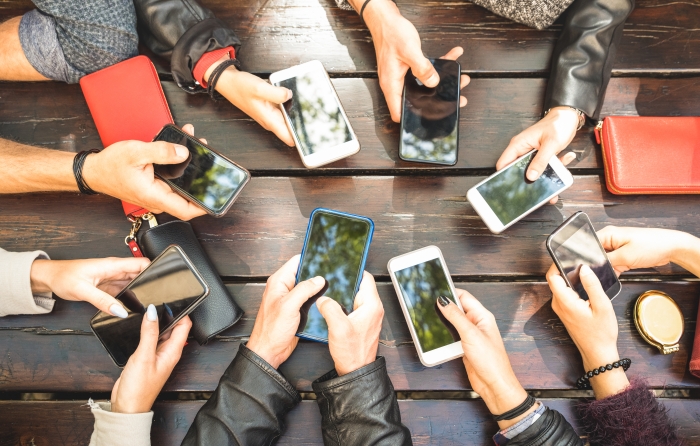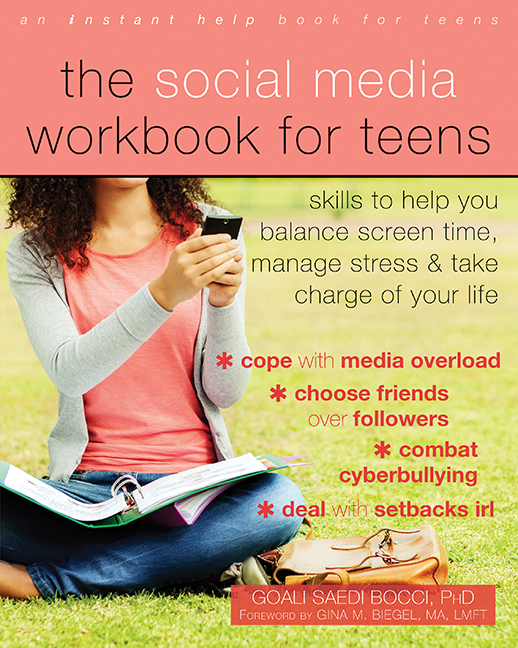By Goali Saedi Bocci, PhD, author of The Social Media Workbook for Teens
It comes as no surprise anymore that social media can be our lifelines. Any number of feeds keep us connected, through selfies and Snapchats, from Instagram to Facebook. Research is increasingly showing that social media is altering our brains, making us addicted to the dopamine hits we get from “likes” and “loves,” as we binge-watch Netflix while mindlessly scrolling and keeping up with the Kardashians. Meanwhile, international researchers have found that going off of social media for as little as one week can significantly boost our happiness levels.
We know social media is stressing us out. We know about Facebook depression. But we can’t stop scrolling! What is going on with us? It’s called a silent epidemic that can be as impactful on our health as our physical well-being—loneliness. It seems counterintuitive that with 1,000 friends, we feel utterly disconnected. How can it be?
Well, for one, highlight reels don’t help. When we are exposed to the “best of” our friends’ lives each time we log on to social media, it can significantly skew our view of reality. Someone is on vacation to a tropical paradise at any given point in time. And if they are not, they are #throwback happy, reminding us of that one Greece vacation they took five years ago. This is the first step and setup to experiencing one’s own life as perfectly mundane. A #FOMO (fear of missing out) constantly nags us at the back of our minds, making us wonder if we need to be globe-trekking despite the real need to stock away for retirement.
Step two, we connect and bond over these photos virtually, in a way that is superficial at best. They brag, we compliment, while secretly feeling miserable, and the cycle repeats. Not exactly the stuff of strong bonding. From there, many of these supposed friends are ones we rarely interact with in real life. Or worse, when we do, there is much awkward silence, as we’ve read about their life before seeing them. It’s like going to lunch with a voyeur!
Amy: I went to Cabo last month with my girlfriends for a bachelorette party.
Monique: I know. You also got a spray tan beforehand, bought a bikini from Victoria’s Secret, and went to that swim-up bar at your hotel.
Amy: Um, yeah…
Step three, we are so busy creating a glamorous picture-perfect life that we fail to be vulnerable and hence find something real worth connecting over. It’s true that few want to be friends with Suzy Sunshine, who has what appears to be a picture-perfect life. Even though it may all be a façade, it is hard to build bridges when no one is opening up about meaningful life experiences. Struggles and hardships are what bring us closer together. This is part of what makes military service members so powerfully bonded. This doesn’t mean we need to be venting and creating false problems in our lives, just that we need to be more well-rounded and genuine in our interactions and how we portray our lives.
The reality is that social media is not a necessary evil. We can choose a life without it, or at least one where we better manage our time and are more mindful of what messages we put out there. Maybe you take a social media sabbatical or do a tech-free weekend (both of which I detail in my book, The Social Media Workbook for Teens). Taking a step back and really assessing your relationship with social media and social acquaintances at large can be transformational. It is easy to sit behind the safety of our screens and pat ourselves on the back that we are being “social” when we leave a comment on a photo. But that takes minimal effort and does not force us to really put ourselves out there. Invite a friend for coffee, practice yoga in a studio instead of on your laptop at home, and stop scrolling. You’ll be amazed at the rich and vibrant life that is out there when you lift your eyes up from your screen.
Goali Saedi Bocci, PhD, is a licensed clinical psychologist in private practice, published author, millennial expert, TEDx speaker, and media personality.



 2024 Peace Playbook: 3 Tactics to Avoid Clashes with Your Partner
2024 Peace Playbook: 3 Tactics to Avoid Clashes with Your Partner